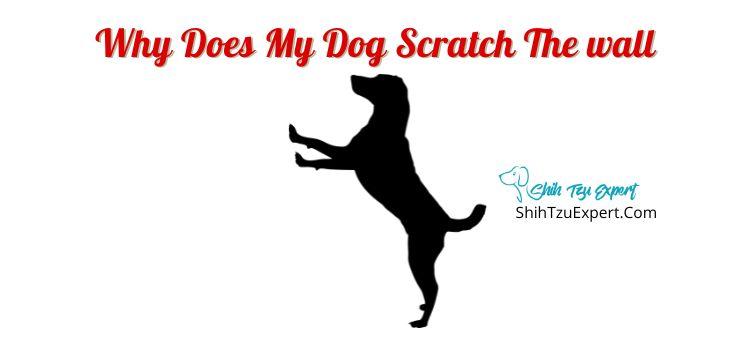Dogs can have weird habits, like scratching and licking the wall. This article will discuss the possible reasons your dog is scratching up your walls and what you can do about it.

Why Does My Dog Scratch The Wall?
Boredom
As all dog owners know, dogs have a lot of energy to get out- especially when they’re younger or if they are a certain breed (e.g., border collies). If they don’t get enough exercise or simulation, they’ll try to find their own way to work off their energy. Since everyone has walls, they’re an easy target.
Dogs will also express their boredom by destroying your furniture, excessively licking their paws, scratching themselves constantly, and excessively chewing.
Anxiety (Separation/Noise)
Dogs may try to relieve stress by scratching at the walls. A recent study found that over 70 percent of dogs display anxiety in some form, whether it be a fear of abandonment, a fear of being alone, a fear of loud noises, or anxiety about traveling or meeting new people.
Separation anxiety is a common form of stress for dogs. If your dog develops separation anxiety, they won’t be able to handle being alone for hours (i.e., while you’re at work). They may try to get their anxiety out by scratching the wall.
Dogs can also get anxious at loud noises, like fireworks or thunder. In this case, the scratching is a fear response as the dog attempts to escape the room and the sound (which they may not realize is coming from outside).
Pica
Pica is a condition that causes dogs to eat things that aren’t food. Usually, a dog with Pica will focus on one or two non-food objects, such as socks or drywall.
Look out for these symptoms:
- Chewing and swallowing things like wood, clothing, plastic, or other non-food items
- Fixating on specific things to eat
- Pieces of plastic or wool in your dog’s poop
- Vomiting non-food items regularly
If your dog has Pica, you should keep a close eye to make sure they don’t eat anything that could lead to a bowel obstruction. If you think your dog has swallowed something that could be life-threatening, take them to the vet.
Critters Hiding In The Wall
Your dog has better hearing and a better sense of smell than you. So if something is in your walls, such as termites, your dog will probably notice before you. They may be trying to get your attention or scare the critters away when they scratch the walls.
If your dog seems to growling and sniffing at the wall a lot as well as scratching, you should call an exterminator.
Dog’s Got An Itch
Your dog may be trying to get out their frustration for an itch they can’t reach. Parasites like fleas and ticks can not only make your dog itchy but can also cause them to scratch at the wall.
You Have Rewarded The Dog For Scratching The Wall
Your dog is constantly looking for positive attention. They will scratch at the wall if they believe you want them to scratch the wall.
When you catch your dog scratching the wall, how do you react? Do you give them pet them and give them treats and tell them they’re good? Or do you punish them and redirect their focus? If the former, you’ve been encouraging your dog to scratch the wall.
A Sudden Burst Of Energy
Some dogs are hyperactive, meaning they can’t keep calm in all situations. This may be the case if your dog doesn’t stop scratching the walls when you tell them to; hyperactive dogs are known to ignore commands.
Dogs are more likely to be hyperactive if they’re younger. They could also have pent-up energy from a lack of exercise.
Certain breeds, such as beagles, dalmatians, and golden retrievers, are more prone to hyperactivity.
Trying To Groom Its Nails
This is actually a very overlooked cause of wall-scratching. If your dog feels like their nails are too long, they can hardly get out the nail clipper and go to town. Instead, they’ll try to shorten their nails any way they can, using the walls as their nail file.
You should have your dog’s nails regularly clipped by a professional. If you can hear a clacking sound when your dog walks on the hard floor, their nails are too long. It is important to get the nails clipped since they can become painful.
Trying To Get Out Of The House
Your dog may be trying to communicate with you.
Some dogs will scratch the front or back door to let their owners know that they need to be let out to do their business. If your dog only does this when they have to go, then it’s nothing to worry about!
You can train your dog to let you know another way if the scratching bothers you. For example, you could train them to ring a bell.
Dog Has Obsessive Compulsive Disorder
That’s right: dogs can have OCD too! According to the Americal Kennel Club, canine OCD is when normal doggy behaviors become excessive.
Rather than just scratching the wall because they’re bored, or anxious, or just feel like it, the dog finds comfort in the action, to the point where they need to scratch the wall to feel less fearful.
Dog Thinks It’s Been Abandoned!
When you leave the house for any reason, such as to go to work or to run errands, your dog has no way of knowing when—or if—you’re coming back. This can trigger their anxiety, which they might end up taking out on your walls.
How Do I Get My Dog To Stop Scratching The Wall?
Eliminate Boredom
Make sure your dog is getting enough stimulation throughout the day! Take them on walks, throw a ball around with them, and make sure they have toys to engage with when you’re too busy to pay attention to them.
Yelling at your dog for scratching the wall won’t help because they’ll see your giving the issue attention as encouragement.
Eliminate Anxiety (Separation/Noise)
Another reason why just yelling at your dog won’t solve the problem is that if your dog is expressing anxiety, the yelling may exacerbate the problem.
What you need to do is reduce your dog’s anxiety. Sometimes, you may be able to remove the object of a dog’s anxiety. Though, if they have separation anxiety, they’ll need to be trained out of it. And if their anxiety is linked to thunder or fireworks, those may not be things you can easily drown out. There are ways to desensitize your dog to these sounds so they won’t react as badly to them in the future.
You may want to talk to your vet about this one. The vet can evaluate the dog, taking into account their dietary habits and medical issues, to see if there is a deeper underlying cause of the wall-scratching. Beyond that, they can prescribe drugs to calm your dog, though this probably shouldn’t be your first choice.
Deterrent Spray
A deterrent spray can make the way taste bad so that your dog will think twice before dwelling by the walls. Because wall-scratching can turn into wall-eating, it is important that not only does the wall smell off-putting; it should also taste off-putting. Many sprays are designed so that your dog can ingest it without ramifications.
Deterrent Sound
A deterrent sound will startle your dog away from the wall. If you catch your dog in the act, you can blast the sound. The dog will start making a negative association with wall-scratching, and they won’t necessarily interpret the action as you rewarding your dog with attention.
Get Pest Control To Clear The Critters From The Wall
If your dog is persistently scratching at the same area of wall, you may have a pest problem.
Be on the lookout for other signs like:
- Animal droppings
- Chewing sounds (from behind the wall)
- A musty smell
You’ll need to bring in an exterminator to do a thorough inspection. Depending on what they find, they’ll recommend either a single treatment or multiple. Either way, you’ll need to keep your dog away from the area since pest control substances can be fatal.
Introduce Anti-Scratching Panels Or Guards
You could try blocking your dog’s access to the walls, but this hardly solves the root of the problem. If your dog is bored or anxious, these are issues you need to address. Beyond that, wall guards are inconvenient. They should really be a last resort.
Exercise The Dog To Burn Off The Nervous Energy
Your dog certainly has a lot of energy to burn off. If you don’t want them to take this energy out on your walls, there are a few things you could try. You could take them for walks, throw around a frisbee with them, or you could train them.
Another way you could burn off their energy is to enlist other dogs to do it. Bring your dog to a dog park or a doggy daycare so they can interact and play with other dogs. If your dog doesn’t mesh well with other animals, you could also hire a dogwalker or petsitter to keep them entertained when you can’t.
Keep Plenty Of Toys
Dogs should have a variety of toys to keep them stimulated, from bones to chew toys to tug toys to interactive toys. That way, they can entertain themselves without having to rely on their humans.
Dogs are attracted to new things, so buying them a new toy is an easy way to get them to redirect. Be careful with how you time this, however: you don’t want your dog to interpret the new toy as a reward for scratching the walls.
Spend Some Time With Your Dog
Your dog doesn’t have much of a life outside of you. You are their whole world. They depend on you to fulfill their emotional needs and as their owner, you are obligated to fulfill those needs.
You need to spend time with your dog so that they can feel connected with you. Spending time regularly with your dog can help them feel secure in their relationship with you. This will also help ease their anxiety.
Install A Camera To Identify The Issue
The best way to get your dog to stop scratching the wall is to know why they are scratching the wall in the first place. A camera may help you figure this out. Is there a certain time of day that your dog scratches the wall? Is there some sort of trigger (such as thunder)? Do they wait until you leave the house to scratch the wall?
What Are The Health Issues That Might Lead A Dog To Scratch Walls?
Fleas
Fleas and other parasites (such as ticks and mites) can cause dogs to compulsively scratch. If this is the case, there are plenty of flea and tick medications and creams for your dog. If your dog has fleas, you should wash your dog’s bed and vacuum all your carpets and furniture to prevent re-infestation.
Allergies
Allergies due to food or environmental factors, like pollen or mold, can cause dogs to scratch at the wall.
You’ll need to figure out what your dog’s allergy is to solve the issue. If it’s a food allergy, you should talk to your vet about changing your dog’s diet.
Other Issues
Your dog may also have eyesight issues, ear problems, or dental issues. It is more likely, then, that the wall-scratching is their way of getting your attention. If you can’t trace the habit back to a more common cause, like anxiety or boredom, you may want to get your dog checked out by a vet to see if any of these issues are applicable.
How To Protect Wall From Dog Scratching?

Most of the ways you can protect your wall have already been mentioned: you can try a spray or sound deterrent, you can try wall protectors, you can try to distract them with toys and treats, and you could make sure your dog gets enough exercise.
You could also try moving your furniture around so your dog has a harder time reaching the wall. You could also try crate training your dog, so your dog will see their crate as a safe place.
Are There Wall Protectors For A Dog Who Scratches?
There are wall protectors that you can buy and are easy to install. However, they aren’t the best solution. If you don’t figure out why your dog is scratching, they’ll just find something else to take out their energy/stress on, like furniture.
How To Repair A Wall Scraped By My Dog?
What you’ll need to do depends on how bad the damage is. For example, if it’s just some scratching, you may only need to paint it over. If you can see drywall, there’s a lot more work to be done.
Use sandpaper to get rid of spots and fill in holes with spackle. Once the area is smoothed over, you can use prime and paint it over.
Why Does My Dog Scratch The Wall At Night (While Sleeping)?
If your dog is scratching the wall while they’re unconscious, it may be a compulsion of theirs.
Why Is My Dog Scratching Wall When Left Alone?
Your dog may have separation anxiety. At least 14 percent of dogs are thought to suffer from this condition, though some breeds (such as German Shepherds and border collies) are more likely to be affected.
Other signs of separation anxiety might include:
- Digging, scratching, and tearing up toys
- Eating their own poop
- Excessive pacing
- Pooping and peeing all over the house
- Scratching at walls, the floor, or doors
- Whining and (non-stop) barking
Why Does My Dog Scratch And Lick The Wall?
There are several reasons why your dog might lick the wall as well as scratch it, such as thirst, sickness, or it feels good. It could also be because the action is compulsive or because your dog is anxious.
To understand why your dog is doing both, you’ll need to consider when your dog first started doing these things, what is different when they do it, and how often they do it.
Can It Cause Harm To The Dog If They Scratch Walls?
Scratching may not necessarily do harm to your dog, though if they can get access to the drywall they might try to eat it.
If your dog started wall-scratching out of the blue, you should pay attention and try to get to the root of the cause. If your dog shows any signs of sickness in addition to this behavior, or if you catch them eating drywall, it’s time to contact your vet.
References
Compulsive Licking, Biting, and Scratching in Dogs (webmd.com)
How to Repair Pet Damaged Walls: Tips Everyone Can Use (martysmusings.net)

![12 Best Dog Foods for Toy Breeds [Buyer's Guide] 12 Best Dog Foods for Toy Breeds [Buyer's Guide]](https://shihtzuexpert.com/wp-content/uploads/2019/05/3-5.jpg)
![Shih Tzu Poodle mix [Your complete guide to Teddy bear dog | Shih Poo | Shoodle or Pooshi] Shih Tzu Poodle mix [Your complete guide to Teddy bear dog | Shih Poo | Shoodle or Pooshi]](https://shihtzuexpert.com/wp-content/uploads/2020/06/Are-You-a-Good-Match-for-a-Shih-Poo.jpg)
![6 Best Dog Treadmills for 2023 [Buyer’s Guide] 6 Best Dog Treadmills for 2023 [Buyer’s Guide]](https://shihtzuexpert.com/wp-content/uploads/2019/04/Best-Dog-Treadmills-1.png)
